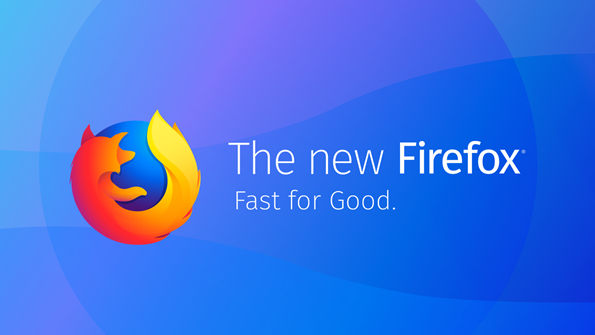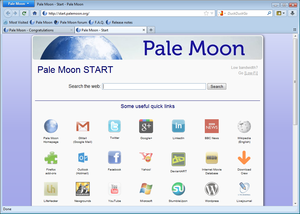| Previous
Page |
PCLinuxOS
Magazine |
PCLinuxOS |
Article List |
Disclaimer |
Next Page |
For Those Who Do Not Like The New Firefox |
|
by Alessandro Ebersol (Agent Smith)  Our dear Chief Editor Paul Arnote wrote an article praising the qualities of the new Firefox, how it is better than it has ever been, and how many users are surprised and fascinated by the new Firefox Quantum. However, I decided to play devil's advocate here, because the new Firefox did not surprise me that much, and despite being much faster, smaller and lighter, appearances can be deceiving. All these qualities are only superficial, since the "new" Firefox abandoned many features that were unique. The first casualties were the add-ons, and if you had some particular addon, needed or used on a daily basis, not being able to use it anymore is very annoying. But I'll get back to this subject in a moment. First, let's look at the past of Firefox, precisely five years ago, when Firefox was surfing a wave of unprecedented success. Firefox in 2013 In 2013, Firefox was at the top of the world. The Mozilla Foundation had launched Firefox OS, and the whole entity (the foundation plus the Mozilla corporation, which was the one that managed the commercial links of the foundation), were aimed at making Firefox OS a top contender among the various mobile OSes that existed then. Not only Firefox OS, but Mozilla was committed to high quality game development with HTML5 (Unreal Engine, Monster Madness) and Javascript (asm.js), was betting big on WebRTC, as a new standard for online communication (bye bye Skype). And thanks to a well optimized and light code, Firefox OS could run on low end mobile phones without problems. Mozilla was aiming at emerging markets where smart phones were luxury goods. Thus, it reached agreements in countries such as Uruguay, India, Bangladesh, Panama, El Salvador, Nicaragua and Poland, among others. There was excitement and anticipation, at every Mozilla's announcement, referring to the Firefox OS. The system was very similar to Android, because it had a Linux kernel, a hardware abstraction layer (HAL) Gonk, Gecko, which was the browser engine of the Firefox operating system, responsible for rendering the HTML, CSS and JavaScript. Gecko included a network stack, a stack for graphics, a layout engine, a virtual machine (for JavaScript execution) and a layer of portability, and Gaia, the system's user interface. Because of its simplicity, it was appropriate for native web applications, and all the apps it had were based on HTML5 + JavaScript and CSS.  The Firefox OS had an elegant interface But in 2014, everything would change, and I think, for the worse. Brendan Eich, the visionary who wanted to do an online revolution Brendan Eich was one of Netscape's employees who helped create the Javascript language in 1995. In early 1998, Eich co-founded the Mozilla project with Mitchell Baker, creating the site Mozilla.org, which should manage all open source contributions to the Netscape source code. He served as the chief architect of Mozilla. After AOL bought Netscape and pulled the plug on the project, he helped in the creation of the Mozilla Foundation.  Eich in an official photo from 2012 He ascended several steps in the organization, serving as CTO from 2005, and being appointed as CEO in March 2014. However, his appointment did not please some members, who left the board of directors of Mozilla foundation after Eich has taken the position. But things did not stop there, and escalated quickly to a very embarrassing outcome. Some employees of the Mozilla Foundation (a separate organization from the Mozilla Corporation, which as I mentioned earlier, is the commercial arm of the entity) requested his resignation, based on his donation of $1,000 for Proposition 8 in California. This banned same sex marriage in California, before being overthrown in 2013, when it was declared unconstitutional and same sex marriages were allowed again. Eich stood by his decision to finance the campaign, but wrote in his blog that he was sorry for "the pain he caused" and promised to promote equality in Mozilla. Some of the activists even created an online shaming campaign against Eich, with the online dating site OkCupid automatically displaying a message to Firefox users, complete with information about Eich's donation and suggesting that users move to a different browser. Other Mozilla Corporation people spoke on their blogs in favor of Eich. Board members wanted him to remain in the company in a different position. On April 3rd, 2014, Eich resigned as CEO and resigned altogether from Mozilla. In his personal blog, Eich posted that "in the present circumstances, I can not be an effective leader." Eich, as one of the creators of JavaScript, wanted to make Firefox a new force on the web, especially with the appeal of web applications running on Firefox OS for mobile phones worldwide. And one very important detail: He was against the adoption of EME's (encrypted multimedia extensions) as a standard in HTML5. He wanted a free web for users, not a locked web by DRM schemes. Eich fell, and Firefox started to go downhill With the whole campaign against him, Eich had no choice but to leave Mozilla Foundation. But Eich's departure affected the development of Firefox and Mozilla, deeper than anyone could anticipate. With him out of the way, Firefox embraced DRM technology for web content, which was lobbied for by Netflix and other companies. Firefox OS was also another project that languished slowly to death, and the dominant companies in the mobile market (Apple, Google and Microsoft to a lesser extent) were not sad about it. It was one less competitor out of the match. So he was struck at first by "friendly fire" from within the Mozilla Foundation, and opposition to him increased to a level that he could not resist. However, many speculated that it was not because of his political views, but because he was opposed to DRM in Firefox and was a force to push forward the Firefox OS in the mobile market. And the decline was so great that Firefox was called the walking dead browser. Firefox Quantum is the new attempt by Mozilla to be the number 1 With the release of version 57, Quantum, Mozilla tries again be the premiere web browser, and its features are really impressive: New rendering engine, written in Rust, able to use multiprocessing to accelerate loading and rendering of web pages, in addition to its optimized code to consume less memory (30% less, say the technicians at Mozilla), a new interface (Photon) and Google returned as the default search for different Western countries (Yandex remains in Russia and Baidu is still default in China), this new Firefox ended up with all the old extensions.  The new add-ons system, the WebExtensions API, retired all extensions/add-ons prior to version 57. As the browser pulled the plug on XUL (XML User Interface Language) to only support extensions developed by WebExtensions API, many popular extensions do not work anymore until its developers port them to the new API. Now, basic add-ons, such as Down Them All, and many others simply stopped working. I think, by the time this article comes out, perhaps these add-ons might have been ported, but what if not? For those who work with Firefox, it was a very hard blow. After all, extensions like Firebug, Web Developer and X-Ray are essential, and may not be ported. And in these times of leaking passwords and exposed profiles on the Internet, Mozilla did a promo stunt for the Mr. Robot series, installed an extension, Looking Glass, without the consent of users, and the internet caught fire. "If Mozilla is positioned as a conscious privacy alternative to Google, Microsoft and others, then install an extension without asking the user first, it does not feel right" - Techcrunch On the other hand, for us Linux users, the dependence of Pulseaudio is something detestable. But fear not: There are alternatives And after all this introduction, we get to the feasible alternatives to Firefox. All those who liked the old Firefox, can have the pleasure to use again all the add-ons and extensions that made Firefox so good. Besides, the old Firefox had great ideas, and some were abandoned along the way (such as the Tab Groups button in FF 45).Palemoon Pale Moon is an open source web browser with an emphasis on customization. Its motto is "Your browser, your way." There are official releases for Microsoft Windows and Linux, an unofficial compilation for MacOS, and several versions made by volunteers for various platforms.  Pale Moon is a Firefox fork with substantial differences, especially for add-ons and user interface. In particular, Pale Moon continues to support the XUL and XPCOM resources that Firefox removed in version 57. Pale Moon also kept the fully customizable user interface of Firefox 4-28, while upgrading other parts of the browser with the new code source from Firefox. Features:
With a fully Customizable interface and support to Firefox add-ons, it is a great option. Waterfox Waterfox is an open-source web browser for 64-bit operating systems, with an aim to be speedy and ethical. There are official releases for 64-bit Windows (including a portable version), MacOS, 64-bit Linux, and 64-bit Android. Waterfox is based on Firefox and is compiled using different compilers and utilizes Intel's Math Kernel Library, Streaming SIMD Extensions 3 and Advanced Vector Extensions. The Linux builds are created with Clang. Waterfox will continue to support the long-standing XUL and XPCOM add-on capability that Firefox removed in version 57.  The Waterfox browser was initiated in March 2011 by Alex Kontos, a 16 year old student. The Waterfox browser was one of the first 64-bit browsers widely distributed on the web and quickly gained a loyal following. At one point, Waterfox had a sole objective: speed. But now Waterfox also tries to be an ethical browser and oriented to the user. Features:
Waterfox is quite impressive. It is like a Firefox 55 with very good features, and the author picks the latest improvements in the Firefox code without getting into conflicting situations regarding the privacy of users or the use of DRM features, which limit the free internet. Verdict It is very interesting to see that the legacy of Firefox lives on. In fact, one of the many advantages of free software is the freedom of forking it when it is not considered satisfying anymore. Sadly, Firefox 57, through its changes and many new features, is no longer the preferred browser of many people (including me). Mozilla is playing to the audience, but the audience of Windows and Mac, hardly for the Linux audience. And now they seem concerned only with gaining Google Chrome's market share and ignoring the very reason that made Firefox's inception, back in ‘98. But to everyone who stopped liking Firefox, there are options. And high-quality options. |





